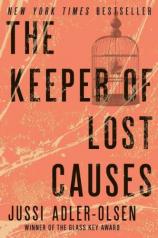The Keeper of Lost Causes
Review
The Keeper of Lost Causes
The current state of the art in the thriller and mystery genres puts me in the mind of the United States in the early 1960s, when The Beatles were introduced --- for the third time, actually --- to American listeners and became phenomenally popular. They were followed by The Dave Clark Five, The Searchers, The Rolling Stones, and a whole bunch of other groups (an early version of The Moody Blues, The Hollies, and does anyone remember Ian & The Zodiacs?). A similar thing is happening now, with the staying power of the Stieg Larsson books. Sure, Nordic crime novels have been popular here before (THE LAUGHING POLICEMAN, SMILLA’s SENSE OF SNOW) but not quite like this, with so many at once and so very well done. There is a deep backlist of books by a considerable number of authors awaiting translation, enough that those of us of a certain age might be kept busy until the end of our days reading them.
"This is a very character-driven series, centered on a brilliant but physically and emotionally damaged Copenhagen police homicide detective named Carl Morck."
Jussi Adler-Olsen is one of those authors just now being introduced to American audiences after writing award-winning works for Nordic audiences for over a decade. His first few offerings were solidly in the thriller genre; THE KEEPER OF LOST CAUSES (originally titled WOMAN IN A CAGE), the first in his Department Q series, was published in 2007. Three have been released since then in Denmark, so we have some catching up to do here. And believe me when I tell you that we will want to do so, if THE KEEPER OF LOST CAUSES is any indication.
This is a very character-driven series, centered on a brilliant but physically and emotionally damaged Copenhagen police homicide detective named Carl Morck. As the book opens, Carl has just returned to work after a disastrous incident involving a police ambush in which one officer was killed, another permanently paralyzed, and Carl scarred inside and out. He was almost impossible to work with before the ambush, yet is too smart and clever a detective to totally remove. A government grant gives his superiors the opportunity to make him a member of Department Q, the Danish equivalent of the Japanese window tribe: he is given an office in a basement and a bunch of cold, all but closed, case files to work with from all over Denmark.
Carl is also given Assad, a Muslim immigrant as a sort of undefined secretary/custodian/assistant. Little does anyone, including Carl, suspect that Assad, for all his quirks --- cultural and personal, among others --- is at any given time one of the smartest people in the room. Assad, in fact, at times steals the book away from Carl, either by accident or by design.
Still, there is that pile of cases. One of them concerns Merete Lynggaard, a popular but controversial political figure who disappeared into thin air some five years previously and has been presumed dead. Lynggaard, of course, is alive, though not very much so. The narration moves back and forth between Carl and Assad, who, over the course of a few hundred pages, develop a (somewhat) finely-tuned working relationship, and Lynggaard, who has been kept captive and tortured for five years in a secret location. There are ticking clocks within ticking clocks here, none of which Carl and Assad are aware until the very end.
Along the way, Carl balances a prickly personal life --- a stepson who needs a boot up the posterior, a quirky tenant, and a wife who won’t get a divorce but won’t live with him, either. Meanwhile, Assad has secrets upon secrets about his life before Denmark, which may or may not be revealed at some point in the future. Hardy, Carl’s paralyzed colleague, also plays a role in the proceedings, perhaps as somewhat of a nod to Jeffery Deaver’s Lincoln Rhyme. Throw in some extremely antagonistic relationships involving Carl and his fellow officers, and you have a riveting, addicting read.
If you come to THE KEEPER OF LOST CAUSES expecting a puzzling mystery, you will not find it here. I am hardly the sharpest blade in the drawer, but I managed to puzzle it out almost immediately. And that was fine. The dark joy is the journey and the traveling companions, good, bad and indifferent, who undoubtedly will appear in future volumes of the series. Hopefully we will see the already existing volumes much sooner rather than later.
Reviewed by Joe Hartlaub on July 5, 2011
The Keeper of Lost Causes
- Publication Date: July 31, 2012
- Genres: Fiction, Mystery, Psychological Suspense, Suspense, Thriller
- Paperback: 416 pages
- Publisher: Plume
- ISBN-10: 0452297907
- ISBN-13: 9780452297906











